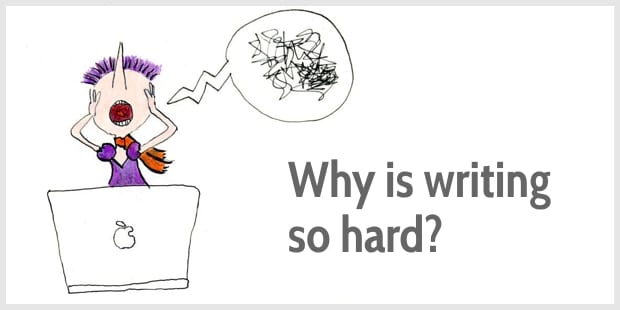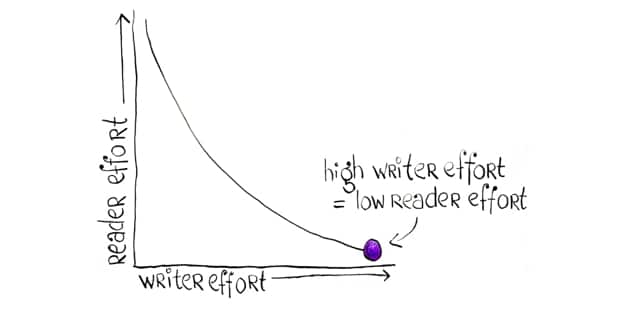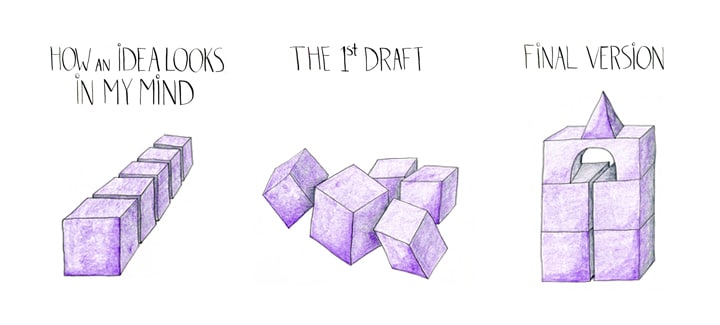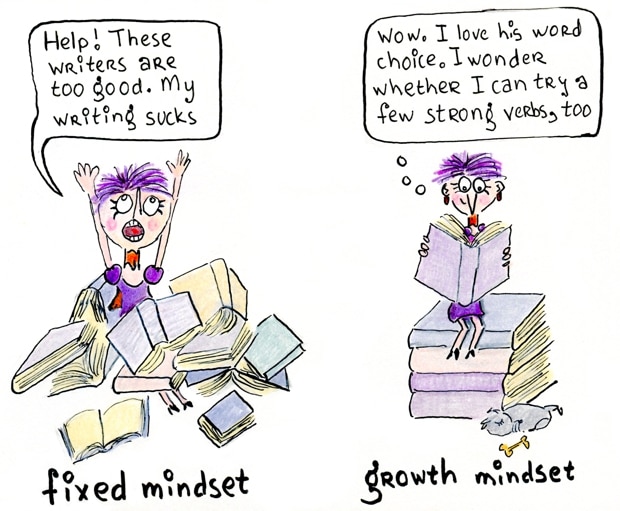 It’s one of the most asked questions in my inbox …
It’s one of the most asked questions in my inbox …
Why is writing so hard?
And variations of that question:
What should I do when the words don’t flow? How can I get my thoughts on paper? What are the routines that make writing easier?
I always try to help people out.
But my answers by email feel insufficient.
Writing IS hard.
Yet, there are ways to make writing more joyful.
Shall I try to explain?
The big misunderstanding about writing
When writing feels easy to read, it can seem like it was also easy to write.
But the lower the effort of the reader, the higher the effort of the writer.

The ideas in our mind may seem crystal-clear but the writing process shows up the kinks and the gaps in our thinking.
So, it’s normal when a first draft turns out wonky. It’s normal when the words don’t flow naturally.
What to do?
Take it step by step. First, write a crappy first draft. Give yourself permission to make it as bad as it needs to be—just to get something on paper.
Next, let your draft simmer for at least 24 hours. Only then, start the revision process:
- See what’s pretty good already—that’s what you can keep
- See what’s redundant—that’s what you throw out
- See what needs improvement—that’s what you start working on
Writing is not just typing words and sentences.
Writing is thinking.
So, the writing process will improve and clarify your ideas.
The habits that help make writing easier:
Understand that writing is a process, take it step by step, and learn to observe and troubleshoot your own process. What’s hard for you? How can you make it easier?

You’re not alone
When I started blogging, my writing process seemed excruciating.
At times, it even seemed impossible (well, almost) to start writing. I procrastinated, and I fought with my inner critic.
That struggle felt lonely.
Much later, I learned that I’m not alone. The blank paper is daunting. Until we try, we don’t know how the ideas in our mind will turn out once we commit them to paper. That uncertainty is scary.
As I write this, I haven’t written a blog post for two months. I had Covid again. My energy has been low, and I needed my limited energy to support my paying students. (Have I told you my new course Stories in Miniature is fun?)
I’ve never written every day. I am a daily-ish writer, and I can deal with short gaps.
But not writing for two months is a long time. It felt like an eternity, and my doubts came roaring back …
Have I lost my knack?!!???
Is this a stupid idea???
Man, I soooo much want to write again. And I soooo much do NOT want to write again.
In my 10+ years of writing I’ve learned that sometimes doubts and fears recede, and at other times they roar back.
I can try to fight or ignore my doubts but my doubts will only get louder. So, I’ve learned to coax myself gently. I’ve learned to dance with my fears.
I wrote the first draft of this blog post in sessions of 9 to 12 minutes. I reminded myself that I’ve been here before. I can do this.
And I’m reframing my fears. They’re not a sign that I’m a crybaby. No, my fears are a sign that I’m doing something that matters to me.
This blog post matters to me. I’m writing this because I want you to use your voice and share your ideas. I believe in you. I want you to write about what matters to you, too.
The habits that help make writing easier:
Invite your inner critic for tea, listen to their concerns, and learn that your inner critic is trying to protect you from failure and critical feedback. Then, write on despite your fears.

The scary gap
You want to write better, right?
But sometimes, do you despair at seeing how well others write?
And then worry your writing isn’t good enough?
We often compare our work harshly with others. It fuels existing insecurities, confirming the negative ideas we already have about ourselves.
Before I seriously started improving my writing skills, I could only see how well others could write, and I didn’t think I could improve my own skills.
But instead of comparing my work harshly, I learned to model my work and evaluate what I can learn. What do I like about other people’s writing? Is it the rhythm? The word choice? The clarity of their ideas? The stories?
There’s a gap between where we are as writers and where we want to be.
No matter how much you improve, that gap will always be there.
Because there’s always more to learn.
So, here’s how I now think about the gap: First, I remind myself that acknowledging the gap is good. At least I can see how I can improve. I know what good writing is.
Secondly, I might not be where I want to be. But I can improve. It might not always be obvious to me but each year, my writing gets better.
The habits that help make writing easier:
Adopt a growth mindset. We might not be as good as we want to be, but we can all learn and get better by emulating good writing.

Be curious. Be playful. Be gentle.
Study your hero writers, and be curious about what makes them good.
Next, adopt a playful mindset. Try to experiment and have fun trying different techniques in your writing.
Improving our skills takes time, and it usually takes longer than we think.
So, be gentle with yourself, my friend.
Happy writing!


Hello Henneke,
Am wishing you a quick recovery.
Having to deal with a set back does suck
Especially your energy may not be up to high levels
But if you continue to be clumsy and fast
Then you will write better
Like you said sometimes as writers we have to give
Ourselves the permission to write a crappy draft
This is the key
Because the crappy draft is the one that drives the creative mind
I love Woody Allen movies
Because his story writing is so good
His movies have nice twists and turns
Sometimes drama movies inspire me to continue writing
Continue writing you are a great teacher
Thank you for your kind words, Lubosi. I’ll get my energy back, slowly but surely! It’s going a bit better every week.
Thanks Henneke for this awakening message. As I read through, all I could see was myself being addressed. I hope to get myself off the hook soon.
Keep inspiring us!
Speedy recovery.
Thank you, Abul. What also can help a lot is taking small steps forward. No need for hairy big goals. Every little step counts. Happy writing!
As always Henneke, you rocked!
I still do doubt my ability a lot.
But, lately, I have started to embrace it.
Now, I feel bit okay with it.
Thanks for inspiring us!
Take care of your health.
Thank you, Manickam. Keep going, keep embracing what you’re doing well!
Love the graphics! “A picture is worth a thousand words.” So, they say. But, your pictures draw the reader to and into your words! No small feat that!
I’m sorry you’ve had another bout with C. Ugh! Hope it will soon be behind you once and for all. Grace and peace.
Thank you for your compliment on the graphics in this post. I also felt like they enhanced rather than interrupted the flow of the words, so great to get that confirmed. Thank you! I’d like to try to do this more 🙂
Hi Henneke, thank you for the words of inspiration. I often sit staring at my screen, and give up because I just don’t know where to start. I’ve started following a few good writers, including yourself, in the hopes it helps me on my writing journey. I am eager to learn so I can start making good habit when it comes to my writing and style. Once again, thanks for what you do.
Hi Matthew,
If you have an idea, but don’t know how to get started, then you might just want to start by writing down some rough notes, next organize your notes, and then turn them into an article or book chapter or whatever you’re writing. Also, remember that you don’t have to write your opening first. You can skip it and write the easier parts first. If I write a series of tips, I start with the easiest tip. Once I get going, the difficult parts seem to become easier. You can also just start typing some gibberish to warm up your fingers and see whether it gets you going.
If you don’t know what to write about, take some time to brainstorm ideas. Think about who you’re writing for and how you want to help them. Leave your ideas simmering for 24 hrs, next pick one idea and mull it over for another 24 hours before outlining an article. (Sometimes, freewriting without an outline works better.)
I hope this helps!
It surely does, thank you so much for putting in the time to give such a helpful response. I really do appreciate it. I’ve seldom come across people online that actually care. You’re amazing!
Glad you’re feeling better Henneke. Thanks for the post.
Good writing will always be hard. Bad writing easy.
We all know where we want to end up.
Yes, so true, Barry: “Good writing will always be hard. Bad writing easy.”
We have to learn to be comfortable with the hard work. It’s a useful skill!
I’ve been to your blog several times and was surprised you haven’t written since March. I didn’t think you were sick! Sorry for you! I’m glad you’re feeling better.
I agree with you. Writing is difficult. Thanks to you, I see that I have progressed in my writing.
Recently, I felt the rhythm of a phrase. I started to see how other people were writing. I am happy !
I keep in mind: But the lower the effort of the reader, the higher the effort of the writer.
Very interesting.
Thank you very much, Henneke, you’re a teacher for me !
I love your writing! The words stay in my mind.
Thank you so much for your lovely comment and for checking my blog for the latest update, Alexandra.
I appreciate you’re welcoming back so warmly!
Wow wow. I loved the way you outlined the dynamic of the ideal, first draft and final version of how our writing looks like. We are too hard on ourselves sometimes. Great article.
Yes, so true. We are too hard on ourselves. And as I learned, it writing becomes much easier if we’re more gentle with ourselves. Thank you for stopping by, Gugu. I appreciate it!
Thanks Henneke. So glad you are feeling better. This post is so real. Absolutely “writing is thinking”.
Thank you, Andrea. I’m glad this post felt real. Happy writing!
I always enjoy your writing. Even though I’m not writing right now, your words are insightful and make me consider getting started again some day! So sorry you got Covid again and am sending healing vibes. Take care of yourself.
Thanks so much for your kind words and healing vibes, Anne. It’s good to be back!
I’m glad you’re feeling much better now, Henneke.
Thank you for sharing this post. I am currently battling my inner critic. And I tell you, it’s been a huge struggle.
It’s nice to know that other people feel these emotions too, and that it’s something anyone can overcome with a little focused effort.
Once again, it’s good to have you back, Henneke.
The struggles with our inner critics can be so hard. But you’re not alone.
If you haven’t read it yet, you may find this useful about my own battle with my inner critic and how I made peace: https://www.enchantingmarketing.com/my-inner-critic/
Thank you for welcoming me back so warmly, Tobenna. I much appreciate it!
Sorry to hear you got COVID. I can attest it’s no fun. Glad you’re well again to write. I was starting to wonder why I hadn’t heard from you.
Love this post. Writing could be hard sometimes, especially when I want to write but have no idea what to write about. Or when I have the idea but am not sure how to start.
It is mostly overthinking on my part. Thanks for the tips here!
Thank you for adding these points, Lux. Indeed. Lack of ideas and overthinking also can make it hard to start writing, especially if faced together!
When I’m out of ideas, I think of my ideal reader and how I can help them. I also check my reading habits—reading inspires a lot of my writing. I know that’s not true for everyone. It can be conversations, too, or just exploring life and new adventures. When we’re out of ideas, the problem is often a lack of creative input.
Thank you for your kind words. Covid is no fun, eh?
For Me , Writing is not hard , how can anything you love doing be hard or difficult?- the hard part is earning a living , even a very meagre living as a writer – I am a freelancer and with few limitations I will write what you want, problem is I never get asked to write a blog or an article or an anything – I offer to do it for free, I send samples if you like my work we go from there if not ‘ Thank you for at least taking the time to read what I wrote” I have done work and not got paid – yup got scammed, people think 0.08 c a word is a lot to pay , that is not a misprint, I got that offer , less than 1 c a word for a 15 00 word article – was I wrong to say ” Thanks, but No Thanks”
I love writing but it can still be hard. Everyone is different and we all have different blocks and challenges.
There are a lot of people who try to take advantage of writers and who don’t appreciate the skill required to write well. I’m sorry you’ve had such bad experiences. It can often help to specialize, such as writing only blog posts for specific niche in which you have some experience already.
I’m sorry to hear you’ve had Covid again. Look after yourself.
Thank you, Sue. I’m doing my best!
Hi Henneke,
I’ve been so wrapped up in your SiM course that it didn’t hit me until today that your blog posting stopped.
Today’s post resonated with me for so many reasons. Here are a few.
First, I am working on my memoir and, therefor, I read a lot of award winning memoirs to learn the craft. I just finished reading, “Wild” by Cheryl Strayed. It is masterfully written.
One problem, though. After I read the last page and put the book down, my inner critic whispered, “Hey, Bill. That memoir you just finished? You’ll never write that good. And your story sucks compared to Cheryl’s.”
I felt deflated, like a bicycle tire that had sprung a leak. I didn’t want to work on my memoir this morning. And I didn’t.
Next, writing is hard because thinking is hard. Even worse, who wants to think when you can ask AI to do it for you? Except, AI can’t feel. AI can’t reach back into it’s childhood and pull out traumatic events and spill them onto the page. Only humans can write about the emotional side of our lives. And that’s what’s hard. Gut wrenching hard.
One final point you bring up is that great writing requires editing. And more editing so that the reading is easy. So, you’re telling me that I have to face down the blank page, get a handle on my jumbled thoughts, write my heart out, and then do it all over again because my first attempt is going to be as bad as me performing on America’s Got Talent?
All of this begs the question…if it’s so damn hard, why do we write?
My answer is, “If you have to ask, you wouldn’t understand.”
It’s great to have you back.
Yes, so many good points in your comment, Bill. I agree that writing a memoir has the extra complication of reliving traumas. That’s why I admire everyone who picks up the courage to start working on a memoir.
I’ve also read many memoirs in recent years, and what I find reassuring that each story has value and each story is different. Your story will be different, too, and it’ll have value, too. There’s only one Cheryl Strayed and only one Bill Honnold. You’re the only one who can tell your story.
There’s value in making sense of our lives, even if our memoirs don’t become bestsellers like Wild.
It is hard work but there’s also beauty in the hard work and the sense-making.
I hope you get back into writing soon. Sometimes it’s easier to start on a new chapter, sometimes it’s easier to do some editing or just re-read what you’ve written so far.
Love the reader/writer effort graph…..that will stick in my mind. Thankyou.
Great! And thank you 🙂
I am glad you are back and we can enjoy your articles again. I love how crisp become the important ideas through illustrations in your blog! Both the writing-reader effort graph and the playing with ideas like playing with wooden cubes are memorable for me. ❤️
Thank you!
I’m also glad to be back. Thank you so much giving me such a warm welcome. ❤️
I’m glad your better again. And I’m so glad to read another masterpiece of you. Thanks a lot for all of your effort. Your blog is really helpful.
And thank you for your lovely comment, Elmke. I appreciate it!
Henneke, I always feel that you truly care about your readers. I want to emulate that in my work.
I love the idea of “Be curious. Be playful. Be gentle.” I want that and a “playful mindset “ in my writing!
I’m pondering these encouraging ideas today.
Thanks for being there for us!
These three feel so important to me—to help us find joy in writing and to improve our skills.
If I’d add one, I’d choose: Be compassionate. Because that will help us connect more strongly with our readers.
I’m starting to think … maybe there’s a blog post in this?
So happy you’re feeling better and are on the road to recovery!!!
Your blogs and emails are the best. So simple and yet so full of ideas, teaching moments along the lines. If I ever become a good writer, it’s because of your influence and methodology. Thank you so much for giving me that inspiration!
Thank you so much for your kind words, Carmen. You’ll get where you want to be. Just keep writing. Keep playing. Keep having fun.
Such a lovely piece. Thanks for writing and sharing it.
Julia Cameron is my writing hero. Her recent book Write for Life and the older The Right to Write are incredibly encouraging and inspiring – they get you writing and keep you on track. In The Right to Write she talks about grabbing stolen moments to write and the fact that you don’t need large chunks of uninterrupted time to write.
Julia says “The “if-I-had-time” lie is a convenient way to ignore the fact that novels require being written and that writing happens a sentence at a time. Sentences can happen in a moment. Enough stolen moments, enough stolen sentences, and a novel is born—without the luxury of time.”
I’ve been so inspired by her perspective that I no longer write in long sessions. Except to edit at times. I try to grab as many stolen moments to write as life happens. Sometimes even a 10 minute writing session can feel substantial.
This has made my writing process light and not self-extracting. This, in turn has made my writing speedy and lively.
Thanks for this blog post Henneke and hope you feel better soon. Take care.
Thank you for sharing this ♥️
So, glad you’ve found your writing hero, Sampada. I remember you mentioning Julia Cameron before. Thanks so much for sharing—it can never be mentioned enough!
I think productivity is different for everyone. I find I’m most productive when I can work in sessions of 25 to 30 minutes. However, when my energy is low, then I have to shorten those sessions and I can still be productive with sessions of 10 minutes. I know some people do less than that.
I also find that if we set our goals low, it’s easier to start writing and we’ll often exceed our goals with ease.
Julia Cameron is one of my hero’s too, Sampada.
So good to know that, Bill!
I’m sorry you’ve felt unwell, but glad to see you’re back! A lot has changed in my life and I haven’t been writing much because of it…except for the blog. I still enjoy reading your posts so I’m glad you feel better and continue to write them!
Thank you, Kim. I’m glad to be back, too 🙂
Welcome back Henneke! I hope you’re starting to feel better and that writing gives you back the enjoyment that COVID has zapped from you. I love that Reader-Effort/Writer-Effort graph. So true. Henneke, you’re my main hero-writer. Total honesty. I need to find more hero-writers, but it’s hard to match you.
Awwww, Mark. You’re making me blush!
’tis true 🙂
I agree, that graph was a head-slap moment for me!
Thank you Henneke.
Great growth mindset illustration! Just keep experimenting, right?
Sorry to hear you had covid again! Hope your energy will return soon and in spades.
Thank you so much, Kitty. I hope to get back to my fortnightly blog writing schedule now. Fingers crossed!
Writing only feels hard when you have to write and not want to write. I think when we discover the art of knowing how to want to write, we unleash the effortless magic.
I’m sorry about your health, Henneke. Hope Henrietta is taking care of you well. Even when she’s abstract I need you to know she cares so much about your health. Make sure you take enough rest and smile a lot. You’re not alone.
Hugs from here❤️❤️
There can be a strange thing about wanting to write and not wanting to write simultaneously. If you’ve never experienced that, praise yourself lucky 🙂
And yes, Henrietta takes care of me. She’s the one nudging me to get back to writing.
Sending hugs back to you. ❤️❤️